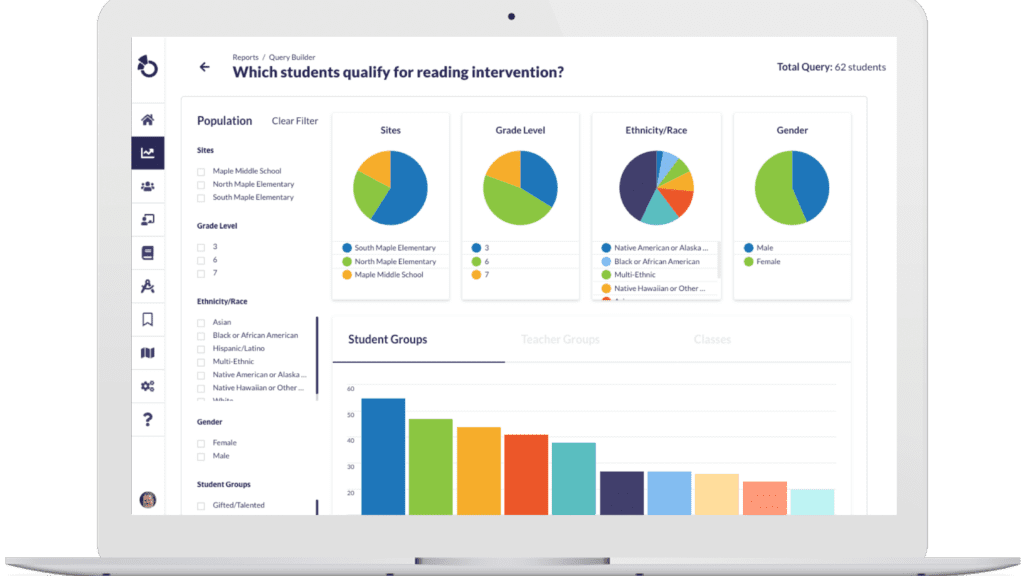Leading with MTSS: Implementation Strategies for Student Success
By: Kendell Hunter
With academic, attendance, and behavioral challenges on the rise, students need support now more than ever. MTSS is one of the most powerful ways school leaders can systematically improve education and engagement in their community.
In this two-part webinar series, educators will learn how to implement evidence-based, high-impact instructional strategies to strengthen Tier 1 and use data to inform instructional decisions to benefit all students, not only those in need of the most support.
This series is led by Amanda Ironside, Director of the MTSS Center at FIRST Educational Resources. Amanda helps school leaders nationwide to strengthen pedagogical practices within their communities so every student receives a high-quality education.
Part 1: Building a Data-Informed MTSS Framework for Student Achievement
Learn how to use multiple measures of student data to inform instructional decisions and benefit all students, not just those in need of the most support. This webinar will help you to revitalize your school district’s MTSS framework using the image of a diamond instead of the traditional MTSS triangle – a model that recognizes the potential to accelerate learning for every student.
Part 2: Strengthening Tier 1 With High-Impact Instructional Practices
This webinar discusses the importance of evidence-based instructional strategies that can be used to ensure an equitable learning environment for every student. Amanda shares specific strategies that educators can implement to ensure high-quality instruction and minimize the need for specialized interventions.
Ready to learn more about how Otus can support data-driven instruction and progress monitoring in your school community?
Three Key Takeaways to Ensure Student Success and Educator Effectiveness through MTSS
The Importance of Establishing a Robust MTSS Framework
The Multi-Tiered System of Supports (MTSS) is an instructional framework designed to address academic gaps, utilize data as a catalyst for change, and foster shared values and beliefs within educational communities. Reflecting on key questions about the framework's implementation, such as its effectiveness in meeting student needs and aligning with educational goals, is essential.
For example, a school district might implement regular MTSS team meetings where educators discuss data trends, share successful strategies, and identify areas needing improvement. This collaborative approach ensures that the MTSS framework is continuously refined to meet the evolving needs of students and align with the district's educational goals.
A unified student data platform like Otus helps educators efficiently manage and analyze data relevant to their MTSS framework. By integrating various data sources, Otus offers a comprehensive view of student performance and needs, facilitating informed decision-making. This holistic approach enables schools to effectively monitor the effectiveness of their MTSS implementation, ensuring that it aligns with their educational objectives and addresses student needs comprehensively.
The Significance of Tier 1 Instruction in MTSS
Tier 1 instruction, or core universal instruction, is the foundation of the MTSS framework. It encompasses research-based instructional practices aimed at enhancing learner growth and achievement across all readiness levels. This tier should ideally cater to approximately 80% of learners meeting grade-level standards without additional interventions. Strengthening Tier 1 instruction is crucial, as it directly impacts the effectiveness of Tiers 2 and 3.
For instance, a teacher might integrate interactive, differentiated learning activities into their daily lesson plans to engage all students at their respective levels. By using a variety of teaching methods, such as group discussions, hands-on experiments, and technology-based tools, the teacher ensures that Tier 1 instruction is dynamic and inclusive, catering to the diverse learning styles within the classroom.
Tools like Otus can assist educators in strengthening Tier 1 instruction by providing access to a wide range of standard-aligned assessments and instructional resources. These tools enable teachers to deliver high-quality, evidence-based instruction tailored to their students' needs. Additionally, Otus' data analysis capabilities allow educators to continuously evaluate and refine their Tier 1 instructional strategies, ensuring they are effectively meeting the diverse learning needs of their students.
Data-Driven Decision-Making and Continuous Assessment
Utilizing various forms of assessment data, including pre-assessments, unit assessments, and district assessments, is vital in the MTSS framework. These assessments help educators understand where students currently stand, set goals for where they need to go and determine the best strategies to get them there. Continuous assessment and feedback are integral to refining instructional practices and ensuring that students are progressing toward their learning objectives.
One way you might see this in the classroom is through an educator using pre-assessment data to group students for targeted instruction in mathematics. Students demonstrating a strong grasp of the concepts could be challenged with advanced problems, while those needing additional support receive focused instruction on foundational skills. This approach, driven by specific assessment data, ensures that each student is engaged at an appropriate level, fostering effective learning and progress.
Integrated student data platforms like Otus streamline the process of data-driven decision-making by offering a platform where educators can easily administer, collect, and analyze assessment data. The tool's ability to integrate data from multiple sources provides a comprehensive view of student progress, aiding in the identification of areas needing intervention. Otus also facilitates ongoing feedback and progress monitoring, enabling educators to make timely and informed decisions to support student learning within the MTSS framework.
Related Resources
Request a demo!
See exactly how Otus can help your school accelerate student growth and improve student outcomes – all while saving educators time.




